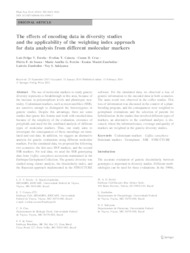The effects of encoding data in diversity studies and the applicability of the weighting index approach for data analysis from different molecular markers.
The effects of encoding data in diversity studies and the applicability of the weighting index approach for data analysis from different molecular markers.
Autoria: FERRÃO, L. F. V.; CAIXETA, E. T.; CRUZ, C. D.; SOUZA, F. de F.; FERRAO, M. A. G.; ZAMBOLIM, Z.; SAKIYAMA, N. S.
Resumo: The use of molecular markers to study genetic diversity represents a breakthrough in this area, because of the increase in polymorphism levels and phenotypic neutrality. Codominant markers, such as microsatellites (SSR), are sensitive enough to distinguish the heterozygotes in genetic studies. Despite this advantage, there are some studies that ignore this feature and work with encoded data because of the simplicity of the evaluation, existence of polyploids and need for the combined analysis of different types of molecular markers. Thus, our study aims to investigate the consequences of these encodings on simulated and real data. In addition, we suggest an alternative analysis for genetic evaluations using different molecular markers. For the simulated data, we proposed the following two scenarios: the first uses SNP markers, and the second SSR markers. For real data, we used the SSR genotyping data from Coffea canephora accessions maintained in the Embrapa Germplasm Collection. The genetic diversity was studied using cluster analysis, the dissimilarity index, and the Bayesian approach implemented in the STRUCTURE software. For the simulated data, we observed a loss of genetic information to the encoded data in both scenarios. The same result was observed in the coffee studies. This loss of information was discussed in the context of a plantbreeding program, and the consequences were weighted to germplasm evaluations and the selection of parents for hybridization. In the studies that involved different types of markers, an alternative to the combined analysis is discussed, where the informativeness, coverage and quality of markers are weighted in the genetic diversity studies.
Ano de publicação: 2014
Tipo de publicação: Artigo de periódico
Unidade: Embrapa Café
Observações
1 - Por padrão são exibidas publicações dos últimos 20 anos. Para encontrar publicações mais antigas, configure o filtro ano de publicação, colocando o ano a partir do qual você deseja encontrar publicações. O filtro está na coluna da esquerda na busca acima.
2 - Para ler algumas publicações da Embrapa (apenas as que estão em formato ePub), é necessário ter, no celular ou computador, um desses softwares gratuitos. Sistemas Android: Google Play Livros; IOS: iBooks; Windows e Linux: software Calibre.
Acesse outras publicações
Acesse a Base de Dados da Pesquisa Agropecuária (BDPA) para consultar o acervo completo das bibliotecas da Embrapa.

